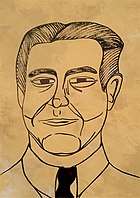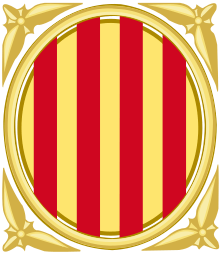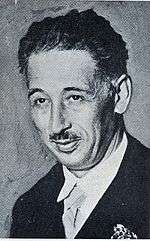Republican Left of Catalonia
Republican Left of Catalonia Esquerra Republicana de Catalunya | |
|---|---|
 | |
| President | Oriol Junqueras |
| Secretary-General | Marta Rovira |
| Founded | 19 March 1931 |
| Headquarters |
C/Calàbria, 166 08015 Barcelona, Spain |
| Youth wing | Young Republican Left of Catalonia |
| Membership (2016) | 8,048 [1] |
| Ideology |
Catalan nationalism[2][3] Catalan independence[4][5][6][7][8][9] Left-wing nationalism[10][11][12] Republicanism[13][14] Democratic socialism[15] Social democracy[16][3] Economic liberalism[17] European federalism[18] |
| Political position | Centre-left[19][20] to left-wing[21][22] |
| European affiliation | European Free Alliance |
| European Parliament group | Greens–European Free Alliance |
| Colours | Orange |
| Congress of Deputies (Catalan seats) |
9 / 47 |
| Spanish Senate (Catalan seats) |
12 / 23 |
| European Parliament |
2 / 54 |
| Parliament of Catalonia |
31 / 135 |
| Town councillors in Catalonia |
2,384 / 9,077 |
| Town councillors in the Balearic Islands |
16 / 925 |
| Website | |
| www.esquerra.cat | |
The Republican Left of Catalonia (Catalan: Esquerra Republicana de Catalunya, ERC; IPA: [əsˈkɛrə rəpubːliˈkanə ðə kətəˈluɲə]) is a Catalan nationalist and democratic socialist political party in the Spanish autonomous community of Catalonia.[23] It is also the main sponsor of the independence movement from France and Spain in the territories known among Catalan nationalists as Països Catalans. Occitan Republican Left, formed in 2008, acts as the Aranese section of the party.
Its current president is Oriol Junqueras and its secretary-general is Marta Rovira. The party is a member of the European Free Alliance.
History

 |
|---|
| This article is part of a series on the politics and government of Catalonia |
|
Statutes and constitutions
|
|
Judiciary
|
|
Public order |
|
Divisions
|
The party was founded in March 1931 as the union of the independentist Estat Català (Catalan State), led by Francesc Macià, the Catalan Republican Party, led by Lluís Companys and the L'Opinió Group of Joan Lluhí i Vallescà. The party had done extremely well in the municipal elections of 12 April 1931. Two days later, on 14 April, few hours before the proclamation of the Spanish Republic in Madrid, Macià declared in Barcelona that Catalonia would become an independent republic within the Iberian Federation. This was not exactly what had been agreed in the Pact of San Sebastián, so three days later they negotiated with the Madrid government that Macià would become president of the Generalitat of Catalonia, an autonomous Catalan government inside the new Spanish Republic.[24] In September 1932, the Spanish Republican Cortes approved the Statute of Autonomy of Catalonia which, among other provisions, granted a Catalan Parliament with full legislative powers, and it was elected on 20 November 1932. The Republican Left of Catalonia won a large majority of seats.
On 6 October 1934, Lluís Companys, elected by the Parliament of Catalonia as new President of the Generalitat after the death of Francesc Macià in December 1933, unlawfully declared a Catalan Republic within a Spanish Federation, following the entry of right-wing ministers of the Spanish Confederation of the Autonomous Right (CEDA) into the Government of the Spanish Republic. The party leaders (including Companys itself) and the Catalan Government were sentenced by the Spanish Republic and jailed, and the Statute of Autonomy of Catalonia was suspended until February 1936.
In 1936, at the dawn of the Spanish Civil War, ERC decided to become part of the Popular Front to contest that year's election, which it won. Esquerra became the leading force of the Popular Front in Catalonia and during the war tried to maintain the unity of the Front in the face of growing tensions between the Workers' Party of Marxist Unification (POUM) and the pro-soviet Unified Socialist Party of Catalonia (PSUC).
The party was declared illegal (along with all other participants in the Popular Front) by Francisco Franco after he came to power in 1939. The former president of the Catalan Generalitat, Lluís Companys, was arrested by German agents in collaboration with Vichy France, returned to Spain and executed on 15 October 1940.
The party is also federated with parties in the Balearic Islands and in Northern Catalonia in France, as well as with Republican Left of the Valencian Country in the Valencian Community. Except for their Balearic counterpart, none of the latter currently have any parliamentary representation in their respective territories, though they do have 8 municipal councillors in the Balearic Islands[25] and 6 councillors in the Valencian Community.[25]
Political principles and representation
Its basic political principles are defined in the Statement of Ideology approved at the 19th National Congress in 1993. This is organised into the three areas that give the organisation its name: Esquerra (commitment to the Left's agenda in the political debate), República (commitment to the Republican form of government vs. Spain's current constitutional monarchy) and Catalunya (Catalan independentism, which, as understood by ERC, comprises the Catalan Countries).
Despite having been one of the main forces behind the movement for amendment, the party eventually opposed the 2006 changes to the Catalan Statute of Autonomy to increase Catalonia's autonomy. It did so on the grounds that it did not do enough to increase Catalan independence. This caused a government crisis with its partners (specially with the Partit dels Socialistes de Catalunya, PSC) which led to an early election in 2006.
Esquerra Republicana de Catalunya has 21 seats in the Catalan Parliament, suffering a dramatic setback after the 2010 Catalan parliamentary election and an equally dramatic gain in 2012, and one seat in the Balearic Parliament. Until 2010, it was one of the three coalition members of the tripartite left-wing Catalan Government, together with Socialists' Party of Catalonia (PSC) and Initiative for Catalonia Greens (ICV). The coalition was often uneasy due to tensions related to the new Statute of Autonomy of Catalonia. The snap election on November 25, 2012 saw ERC rise to a total of 21 seats in the Catalan Parliament.
Out of Catalonia, it has nine seats (fifth largest group by seats) in the Spanish Parliament and two seats in the European Parliament.
Presidents
- Francesc Macià (1931-1933)
- Lluís Companys (1933-1935)
- Carles Pi i Sunyer (1933-1935)
- Lluís Companys (1936-1940)
- Heribert Barrera (1993-1995)
- Jaume Campabadal (1995-1996)
- Jordi Carbonell (1996-2004)
- Josep-Lluís Carod-Rovira (2004-2008)
- Joan Puigcercós (2008-2011)
- Oriol Junqueras (2011-)
General Secretaries
- Joan Lluís Pujol i Font (March 1931 - April 1931)
- Josep Tarradellas (April 1931 - March 1932)
- Joan Tauler (March 1932 - 1938)
- Josep Tarradellas (1938 - 1957)
- Joan Sauret (1957 - 1976)
- Heribert Barrera (1976-1987)
- Joan Hortalà (1987-1989)
- Àngel Colom Colom (1989-1996)
- Josep-Lluís Carod-Rovira (1996-2004)
- Joan Puigcercós (2004-2008)
- Joan Ridao i Martín (2008-2011)
- Marta Rovira i Vergés (2011-)
Electoral performance
Parliament of Catalonia
| Date | Votes | Seats | Status | Size | Notes | |||
|---|---|---|---|---|---|---|---|---|
| # | % | ±pp | # | ± | ||||
| 1932 | 224,800 | 47.1% | — | 56 / 85 |
— | Government | * | |
| 1980 | 240,871 | 8.9% | — | 14 / 135 |
— | Opposition | 5th | |
| 1984 | 126,943 | 4.4% | –4.5 | 5 / 135 |
Government | 5th | government 1984–87 | |
| 1988 | 111,647 | 4.1% | –0.3 | 6 / 135 |
Opposition | 5th | ||
| 1992 | 210,366 | 8.0% | +3.9 | 11 / 135 |
Opposition | 3rd | ||
| 1995 | 305,867 | 9.5% | +1.5 | 13 / 135 |
Opposition | 5th | ||
| 1999 | 271,173 | 8.7% | –0.8 | 12 / 135 |
Opposition | 4th | ||
| 2003 | 544,324 | 16.4% | +7.7 | 23 / 135 |
Government | 3rd | government 2003–06 | |
| 2006 | 416,355 | 14.0% | –2.4 | 21 / 135 |
Government | 3rd | ||
| 2010 | 219,173 | 7.0% | –7.0 | 10 / 135 |
Opposition | 5th | ||
| 2012 | 498,124 | 13.7% | +6.7 | 19 / 135 |
Opposition | ** | government support | |
| 2015 | 1,628,714 | 39.6% | n/a | 20 / 135 |
Government | *** | ||
| 2017 | 935,861 | 21.4% | n/a | 32 / 135 |
Government | ** | ||
- * Within Esquerra Catalana.
- ** Within Republican Left of Catalonia–Catalonia Yes.
- *** Within Junts pel Sí.
Parliament of the Balearic Islands
| Date | Votes | Seats | Status | Size | |||
|---|---|---|---|---|---|---|---|
| # | % | ±pp | # | ± | |||
| 1995 | 2,082 | 0.6% | — | 0 / 59 |
— | N/A | 7th |
| 1999 | 1,106 | 0.3% | –0.6 | 0 / 59 |
N/A | 8th | |
| 2003 | 1,667 | 0.4% | +0.1 | 0 / 59 |
N/A | 9th | |
| 2007* | 37,572 | 9.0% | +8.6 | 1 / 59 |
Government | ** | |
| 2011*** | 5,325 | 1.3% | –7.7 | 0 / 59 |
N/A | 8th | |
| 2015 | 766 | 0.2% | –1.1 | 0 / 59 |
N/A | 17th | |
- * In Ibiza, within PSOE–Ibiza for Change.
- ** Within Bloc for Majorca.
- *** In Ibiza, within PSOE–Pact for Ibiza.
Cortes Generales
Spain
|
| ||||||||||||||||||||||||||||||||||||||||||||||||||||||||||||||||||||||||||||||||||||||||||||||||||||||||||||||||||||||||||||||||||||||||||||||||||||||||||||||||||||||||||||||||||||||||||||||
- * Within Left of Catalonia–Democratic Electoral Front/Entesa dels Catalans.
- ** Within Nova Entesa.
- *** Within Catalunya al Senat.
- **** Within Catalan Agreement of Progress.
Catalonia
|
| ||||||||||||||||||||||||||||||||||||||||||||||||||||||||||||||||||||||||||||||||||||||||||||||||||||||||||||||||||||||||||||||||||||||||||||||||||||||||||||||||||
- * Within Left of Catalonia–Democratic Electoral Front/Entesa dels Catalans.
- ** Within Nova Entesa.
- *** Within Catalunya al Senat.
- **** Within Catalan Agreement of Progress.
Balearic Islands
|
| |||||||||||||||||||||||||||||||||||||||||||||||||||||||||||||||||||||||||||||||||||||||||||||||||||||||||||
- * Within Progressives for the Balearic Islands.
- ** Within Unity for the Isles.
- *** Within Sovereignty for the Isles.
European Parliament
|
|
| |||||||||||||||||||||||||||||||||||||||||||||||||||||||||||||||||||||||||||||||||||||||||||||||||||||||||||||||||||||||||||||||||||||||||||||||||||||
- * Within Europe of the Peoples.
- ** Within Left for the Right to Decide.
See also
References
- ↑ Robert Tugas: ERC, un partit que creix en vots però no en militants. Ara, 13/03/2016.
- ↑ Guibernau, Montserrat (2004), Catalan Nationalism: Francoism, transition and democracy, Routledge, p. 82
- 1 2 Hargreaves, John (2000), Freedom for Catalonia?: Catalan Nationalism, Spanish Identity and the Barcelona Olympic Games, Cambridge University Press, p. 84
- ↑ Buffery, Helena; Marcer, Elisenda (2011), Historical Dictionary of the Catalans, Scarecrow Press, p. 198
- ↑ Paluzie, Elisenda (2010), "The costs and benefits of staying together: the Catalan case in Spain", The Political Economy of Inter-Regional Fiscal Flows: Measurement, Determinants and Effects on Country Stability, Edward Elgar Publishing, p. 367
- ↑ Hooghe, Liesbet; Marks, Gary; Schakel, Arjan H. (2010), The Rise of Regional Authority: A Comparative Study of 42 Democracies, Routledge, p. 194
- ↑ Schrijver, Frans (2006), Regionalism After Regionalisation: Spain, France and the United Kingdom, Vossiuspers, Amsterdam University Press, p. 112
- ↑ McLaren, Lauren M. (2008), Constructing Democracy in Southern Europe: A Comparative Analysis of Italy, Spain, and Turkey, Routledge, p. 184
- ↑ Roller, Elisa (2004), "Conflict and Cooperation in EU Policy-Making: The Case of Catalonia", The EU and Territorial Politics Within Member States: Conflict Or Co-Operation?, Brill, p. 80
- ↑ Alonso, Sonia (2012), Challenging the State: Devolution and the Battle for Partisan Credibility, Oxford University Press, p. 77
- ↑ Ramiro, Luis; Morales, Laura (2007), "European integration and Spanish parties: Elite empowerment amidst limited adaptation", The Europeanization of National Political Parties: Power and organizational adaptation, Routledge, p. 146
- ↑ Moreno, Luis; Colino, César (2010), "Kingdom of Spain", Diversity and Unity in Federal Countries, McGill-Queen's University Press, p. 299
- ↑ "ERC diferencia el seu republicanisme del del PDC". El Món. Retrieved 8 August 2017.
- ↑ "PONÈNCIA POLÍTICA 27è Congrés Nacional" (PDF). Archived from the original (PDF) on 8 August 2017. Retrieved 8 August 2017.
- ↑ Nordsieck, Wolfram (2017). "Catalonia/Spain". Parties and Elections in Europe. Retrieved 3 October 2018.
- ↑ Guibernau, Montserrat (2004), Catalan Nationalism: Francoism, transition and democracy, Routledge, p. 82
- ↑ Face to Face - Interview with Oriol Junqueras (leader of Catalan Republican Left). PressTV News Videos. YouTube. Timestamp 5:45 - 5:52. Published 18 December 2015. Retrieved 4 August 2017.
- ↑ https://www.esquerra.cat/ca/una-republica-catalana-en-una-europa-federal
- ↑ Catalan trial turns into pro-independence show of force. Politico. Author - Diego Torres. Published 2 February 2017. Updated 9 February 2017. Retrieved 4 August 2017.
- ↑ Catalan separatists projected to win snap election. Al Jazeera. Published 21 December 2017. Retrieved 16 May 2018.
- ↑ Jaume Ribas Vilanova. "En un país normal, una socialdemocràcia normal". LaColumna.cat.
- ↑ jaume. "Junqueras dice que CiU y PSC son "la vieja política" rendida al poder". El Periódico.
- ↑ Jaume Renyer Alimbau, ERC: temps de transició. Per una esquerra forta, renovadora i plural (Barcelona: Cossetània, 2008).
- ↑ "The Battle for Spain" Beevor (2006) p.25
- 1 2 Dades electorals detallades de les Eleccions Locals 2011, arxiu històric electora, accessed 28 November 2012
External links
- Official website (in Catalan)
- Ideological declaration (in English) (PDF)
- ERC’s brief history (in English) (PDF)
- Joventuts de l'Esquerra Republicana de Catalunya Youth section's site (in Catalan)
